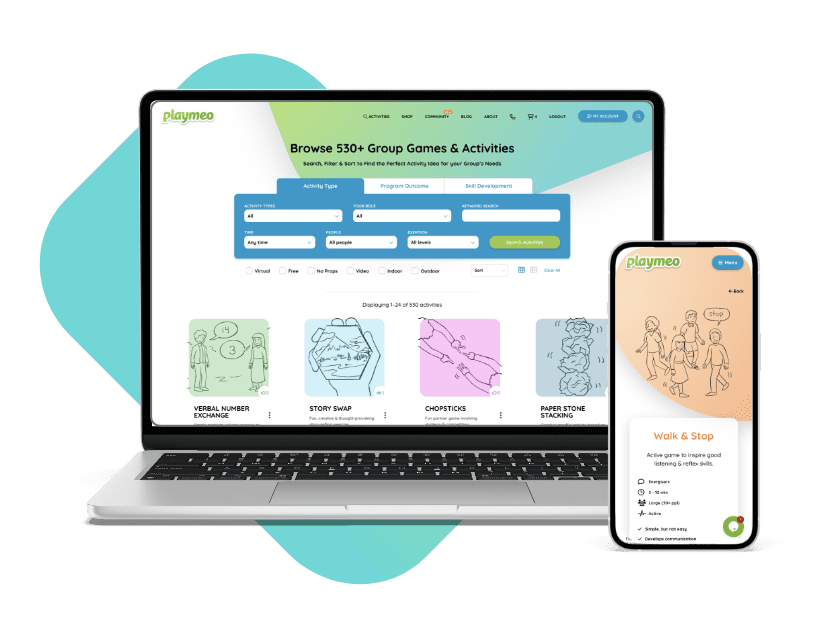Why You Need to Improve Your Story-Telling Skills
In this week’s Facilitator Tips episode, I’m excited to share some of the most powerful reasons I choose to tell stories with the groups I lead and why you should, too.
<< Go to Episode 56 Go to Episode 58 >>
Telling stories is powerful not only for the sheer joy, laughter and insights they bring to me and my groups but also for the way they often help me to find the right words to say.
Many of us grew up loving stories being read to us as a child, and in my experience, adults love having stories being told to them just as much.
Click the play button above to discover why telling stories is so powerful.
Want to join the conversation?
Please leave a comment at the bottom of the page (you must be logged in.)
Don’t have a playmeo account? Join today.
Useful Links & Resources
- Story Skills Workshop – I completed this online course in late 2019 and loved every minute of it. Created by leading story strategist and author, Bernadette Jiwa, it will help you tell better stories by giving you a simple, yet powerful structure to follow and practice. Highly recommended.
- Case Studies – take a few moments to read the stories of a bunch of playmeo members and enthusiasts. They will quickly engage you and transport you to a time in your own leadership when you faced similar dilemmas and issues.
…EE
Video Transcript
Hi there and welcome to Episode 57 of the Facilitator Tips video series.
My name is Mark Collard, I’m an experiential trainer and an author, and today I want to talk to you about the power of stories, in particular as in pertains to leadership.
We all love stories. When you think of your children or when you were a child, how often did you enjoy being absorbed into the story that was being told to you? And to be fair as adults we love stories just as much, maybe not necessarily always in a book, but a film or theatre or some other way in which you are immersed in something, some experience that is being shared with you.
And I want to talk to you about beyond just the sheer joy of being immersed in a story, some other benefits of having stories integrated throughout your leadership or throughout your program.
The first real benefit that I discovered is that it frames the experience. You know those times when you really don’t have the words to describe what’s going on or to set up or frame an experience? I found a story can be really useful. Or alternatively, at the end of the experience you know there’s something there but you don’t think that you can find the right words. A poem, a story, an anecdote can be the perfect thing to actually engage that group with what’s actually going on for them.
And you can never have enough laughter. What I often say is too much laughter is never enough. Any opportunity where you can get your group to laugh really loosens and disarms them, and there are many stories that can allow you to do that, whether they’re taken from your own personal experience or just simply for the sheer enjoyment of having a laugh.
Importantly, I think this is where it’s really important for me in my leadership is the authenticity.
I frequently weave stories in and out of my leadership, no matter the context of my program, that shares a little bit about me. It makes me vulnerable. Often those times when I’ve made a mistake or I could’ve done something better and I share that story… and here’s the critical element of why they’re so powerful, is that people care. You can see them nodding their heads. They can understand that while you’re talking about yourself, they see themselves in those stories.
So whether it’s a story you tell about yourself or alternatively a story that they can actually engage themselves and hear themselves as the central character, that can be really helpful in helping that group connect.
And the final part is empathy. I’ve done some research in understanding what really makes a story powerful and effective, and it’s when the characters… you feel that you can care for them. You may not like them, but you can have some sort of empathy for their world view, about how they’ve made their decisions, the dilemma they’re in and the sorts of choices that they have been faced with. And of course, that’s just anywhere where humans turn up. There are always stories to tell.
So if this is new for you, start finding a few stories that you can weave in, or indeed even ask the group to share a story connected to maybe some of the content that you have done. So that would be my last minute tip. Go lookout for stories, think of stories that you can integrate that connect directly to the outcomes that you’re trying to achieve.
There are going to be some show notes where I can direct you to some resources about how you can tell more effective stories. So go to www.playmeo.com Episode 57. And I hope you’ve enjoyed this. If you’ve got some comments, maybe you’d like to share one of your favourite stories, leave a comment here at the video tutorial as well.
Otherwise, I’ll look forward to seeing you in Episode 58.
Bye for now.







There are currently no comments